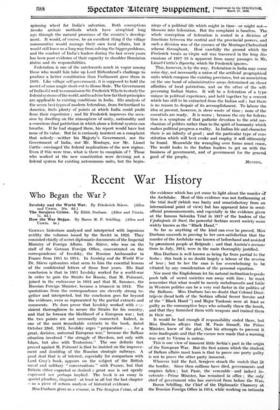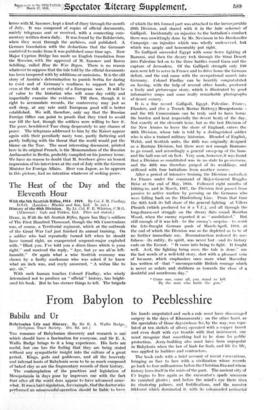Recent War History
Who Began the War ?
GERMAN historians analysed and interpreted with ingenious avidity the volumes issued by the Soviet in 1922. They consisted chiefly of secret diplomatic documents of the Imperial Ministry of Foreign Affairs. Dr. Stieve, who was on the staff of the German Foreign Office, concentrated on the correspondence of Isvolsky, the Russian Ambassador in France from 1911 to 1914. In Isvolsky and the World War Dr. Stieve epitomizes what seem to him the essential lessons of the confidential letters of those four years. His final conclusion is that in 1911 Isvolsky worked for a world-war in order to gain the Straits for Russia, that M. Poineare, joined in the endeavour in 1912 and that M. Sazonov, the Russian Foreign Minister, became a triumvir in 1913. The quotations from the correspondence are cleverly strung to- gether and interpreted, but the conclusion goes far beyond the evidence, even as represented by the partial extracts and comments. He does prove that Isvolsky worked with ena- sistent thoroughness to secure the Straits for his country, and that he foresaw the likelihood of a European war ; but the two points are not necessarily connected. Indeed, in one of the most remarkable extracts in the book, dated October 23rd, 1912, Isvolsky urges " preparation . . . for a great, decisive, universal European war," because the Balkan situation involved " the struggle of Slavdom, not only with Islam, but also with Teutonism." The one definite fact proved against M. Poineare is that he insisted on the improve- ment and doubling of the Russian strategic railways. A good deal that is of interest, especially for comparison with Lord Grey's book, appears on the subject of the British naval and military " conversations " with France, but that Britain either expected or desired a great war is not Openly expressed nor perhaps implied. The book is an essay in special pleading, disguised- —at least in all but the last chapter --as a piece of serious analysis of historical evidence.
Miss Durham gives us a resume, in The Serajevo Crime, of all
the evidence which has yet come to light about the murder of the Archduke. Most of this evidence was not forthcoming at the trial itself (which was hasty and unsatisfactory from an international point of view) but has appeared later in semi- official pronouncements, and especially in the evidence given at the famous Salonika Trial in 1917• of the leaders of the Ujedinjenie iii Smrt, the powerful Serbian secret society more
widely known as the "Black Hand." • So far as anything of the kind can ever be proved, Miss Durham succeeds in proving to her own satisfaction that the murder of the Archduke was known of beforehand and assisted by prominent people at Belgrade ; and that Austria's accuse: tions in July, 1914, were in the main thoroughly justified.
Miss Durham is well known as being far from partial to the Serbs ; this book is no doubt largely a labour of the reverse of love ; but to her the case is too overwhelming to be vitiated by any consideration of the personal equation.
Nor must the Englishman let his natural inclination to pooh-
pooh talk of secret societies run away with him ; must. remember that what would be merely melodramatic and futile in Western politics can be a very real factor in the politics of the Balkans. Miss Durham has no doubt that Colonel Dimi- trijevic (head both of the Serbian official Secret Service and of the " Black Hand ") and Major Tankosic were at least as guilty as the consumptive boys who actually threw the bomb, and that they furnished them with weapons and trained them in their use.
It would be bad enough if responsibility ended there, but Miss Durham alleges that M. Pasic himself, the Prime Minister, knew of the plot,,,tbat his attempts to prevent it were inadequate and that the excuse now made that a warning was sent to Vienna is untrue.
This is one view of innocent little. Serbia's part in the origin. of the European War. But the first axiom which the student. of Balkan affairs must learn is that to prove one party guilty is not to prove the other party innocent.
Whoever laid the fuel, Serajevo struck the match that lit the bonfire. Since then millions have died, governments and empires fallen ; but Pasic, the venerable—and indeed, in- veterate—Prime Minister, has remained in office ;. the only, chief of government who has survived from before the War,
Baron Schilling, the Chief of the Diplomatic Chancery at the Russian Foreign Office in 1914, while working on intimate
terms with M. Sazonov, kept a kind of diary through the month of July. It was composed of eopies of official documents, mainly telegrams sent or received, with a connecting com- mentary written down daily. It wasfound by the Bolshevists, when they went through the archives, and published. A German translation with the deductions that the Germans contrived to make from it was published some time ago. Now Major Cy-prian Bridge has made an English translation from the Russian, with the approval of M. Sazonov and Baron Schilling, called How the War Began. There is no reason whatever to suppose that the tale told by the official documents has been tampered with by additions or omissions. It is the old story of Austria's determination to punish Serbia for daring to exist and of Germany's readiness to support her ally even at the risk or certainty of a European war. It will be of value to the historian who will some day coldly and impartially examine the evidence. Till then, though it is right to accumulate records, the controversy may just as well sleep, at any rate until European good will is better established. We will, therefore, only say that the Russian Foreign Office can point to proofs that they tried to avoid. war till the last, though the soldiers were willing to face it.. The poor, bewildered Tsar clung desperately to any chance of peace. The telegrams addressed to him by the Kaiser appear again with their peculiarly nasty tone, partly flattering and partly bullying with the threat that the world Would put the blame on the Tsar. The most interesting doeument, printed here in its original French; is the Memorandum of the Russian Ambassador in Berlin, probably compiled on his journey home. We have no reason to doubt that M. Sverbeev gives an lionest impression Of his interviews at the end of July with the German Minister for Foreign Affairs. Herr von Jagow, as he appears in this picture, had no intention whatever of seeking peace.























































 Previous page
Previous page